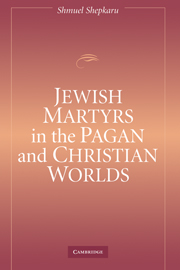Book contents
- Frontmatter
- Contents
- Preface
- Introduction
- 1 Mythic Martyrs
- 2 Between God and Caesar
- 3 “It Is Written in the Law”
- 4 Byzantine Burnt Offerings
- 5 Zarfat
- 6 Ve Ashkenaz: Traditional Manifestations
- 7 Ve Ashkenaz: Manifestations of a Milieu
- 8 Singing in the Fire
- 9 Fire from Heaven
- 10 Shifting Paradigms
- Notes
- Bibliography
- Index
10 - Shifting Paradigms
Published online by Cambridge University Press: 17 July 2009
- Frontmatter
- Contents
- Preface
- Introduction
- 1 Mythic Martyrs
- 2 Between God and Caesar
- 3 “It Is Written in the Law”
- 4 Byzantine Burnt Offerings
- 5 Zarfat
- 6 Ve Ashkenaz: Traditional Manifestations
- 7 Ve Ashkenaz: Manifestations of a Milieu
- 8 Singing in the Fire
- 9 Fire from Heaven
- 10 Shifting Paradigms
- Notes
- Bibliography
- Index
Summary
Ashkenazic and Sepharadic exiles carried their martyrologies, hagiographies, and the liturgies that commemorated their medieval heroes to their new localities. With the migration from west to east and the transition from the Middle Ages into the modern period, there emerged also alterations in the use of the martyrological idea. Martyrological symbols and metaphors continued to be extensively utilized in different aspects of Jewish life and lore. Based on the medieval perception that all Jews lived as potential martyrs in the “hour of persecution,” life in exile was compared to a form of martyrdom.
“Many cremations for the sanctification of your Name were there, and many times they chose suffocation for their souls. They sacrificed their sons and daughters not to defile Your Name.” This is how R. Joseph ibn Yihyya of the exile generation described the life of the many forced converts (ha-anusim). Even Rabbi Abraham ben Eliezer ha-Levi's Megillat Amraphel, which instructed readers how to mentally prepare for actual martyrdom, described life in exile as a virtual voluntary death. Every man who “decides in his heart to submit himself to Him by his body and soul, and also his wife and his children, in order to love Him with all his heart and all his soul and all his might,” promised the rabbi, “goes to the light of life with the righteous and the hasidim and the holy ones.” Both the decision and the act remain “in his heart.”
- Type
- Chapter
- Information
- Jewish Martyrs in the Pagan and Christian Worlds , pp. 272 - 278Publisher: Cambridge University PressPrint publication year: 2005



